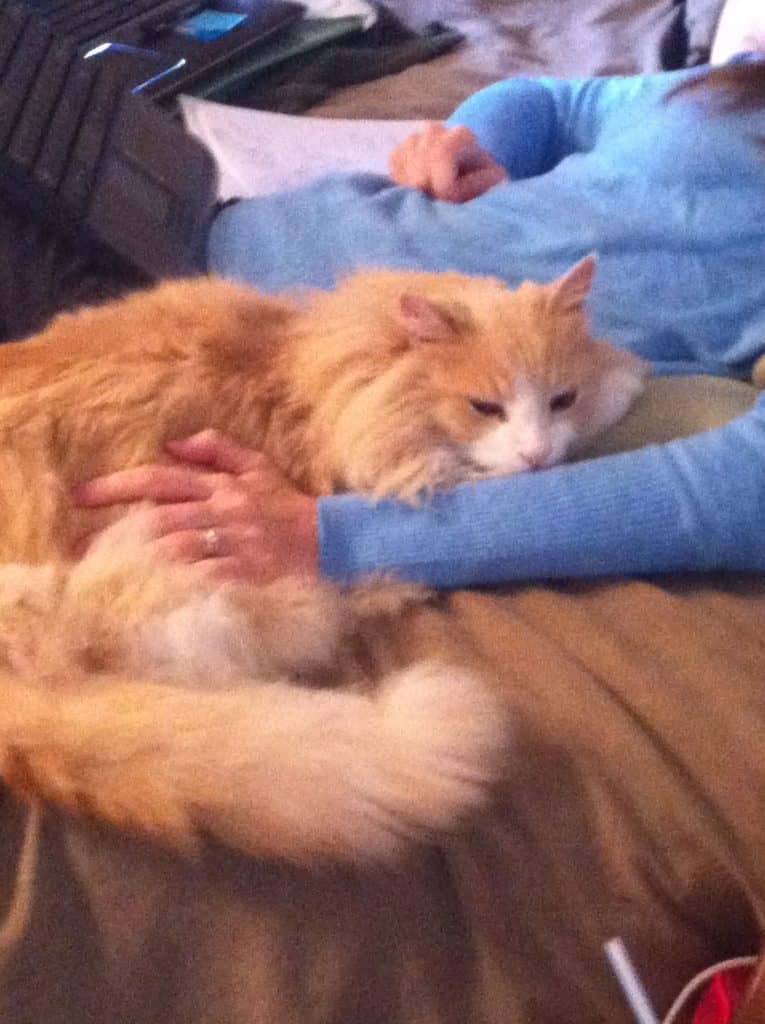“You. Can. Do. This.”
For as long as I can remember, these are the words I mutter under my breath when I’m struggling with something that’s hard, slightly out of reach, possibly impossible.
Like when I was trying to hammer a fence post into the rock-hard soil to keep the dog from escaping our yard. That was 20 years ago and dog-gone-it, I did get that fence post into the ground. Not deep. But done.
Or when I was going through stem cell therapy 6 years ago and relearning how to walk. Yeah, that was fun.

This is me, on my first trip to Panama for treatment, trying hard to look like nothing’s wrong. (I think I pulled it off pretty well.) What you don’t realize is that I’m just barely holding myself up, and that’s as far as I can turn my head. I wasn’t able to twist for another 2 years.
What I’ve learned over the years is that if you believe you can do something and you’re willing to put in the work, you absolutely can do it.
Of course, I put that theory to the test on a regular basis. Nothing like straining your potential.
But that “never give up” mindset is what landed me here, now, as a professional writer earning a good living from my skills, with several books published and an international roster of clients.
So how did I do it?
Looking back, I realize there were a handful of pivot points, and the decisions I made at each of those moments brought me one step closer to my ultimate dream. So let’s start with the dream.
Rich and Famous Writer
That’s the goal I set for myself when I was a kid. I didn’t know anything about making a living as a writer. I simply loved reading and wanted to create enchanting stories like the ones I read.
Notice I didn’t just want to write. I wanted to make money writing. I wanted to be a rich and famous writer.
Laugh if you want, but deep down, I think that’s the goal of every writer. We want to be free to create, and we want to be recognized for what we do.
Writing is a labor of love, sure, but we want the world to appreciate that labor.
Sadly, though, writing is usually seen as a commodity. As a result, it’s severely devalued. Most writers—even good ones—make minimum wage from their writing, if that.
A survey by The Guardian found that self-published authors earn, on average, just $10,000 a year. There are the stand-outs, of course; Amanda Hocking earned $2.5 million. But according to the survey, half of self-published authors made $500 or less.
The Authors Guild‘s research supports these findings. They’ve found that only a third (39%) of authors can support themselves exclusively through writing-related work.
In other words, the choice to be a writer is often a choice to work two jobs for the rest of your life—one to pay the bills, the other to pursue your writing dreams.
Pivot #1: Be the Artist or Make Money Writing
Fast forward a few decades. I’d spent my entire adult life pursuing writing, and I’d discovered first-hand that those statistics are right.
I wrote magazine and newspaper articles, did pro bono work, invented games, and wrote a slew of books, stories, and plays. Some were well-regarded, most ignored, and none of them earned significant money.
Then came my first pivot point. It was my 40th birthday, and I suddenly realized I was no closer to reaching my writing goals than I was when I started my journey. I was facilitating everyone else’s dreams but not my own.
I had to acknowledge that some of my “creative resistance” was situational. I was homeschooling two kids and managing a busy home. But some of it was a combination of fear and not knowing how to get started.
That’s when I made the commitment. “You. Can. Do. This.”
Maybe my fears were right. Maybe I wasn’t good enough. Maybe I didn’t have what it took. But I’d never know if I didn’t try.
Really try.
So I committed to do whatever it takes to succeed as a writer. Right away, I signed up for a writing conference and began reading everything I could my hands on.
First, I discovered that writing isn’t an art. It’s a business. (Weirdly, that was a life-changing discovery.)
Second, I decided I’d rather make money with my writing than be the starving artist.
Back in my 20s, when I worked in public relations, my boss encouraged me to follow in her footsteps. I declined. I was afraid I’d have nothing left for my books if my day job involved writing.
But at age 40, with no big publishing contract and none on the horizon, I realized it isn’t your day job that zaps your creativity. Life does that. Armed now with the realization that all writing is a business, I was willing to change my approach.
Rich and famous writer.
That was the goal. And I could reach that goal if I’d simply switch to writing for business. So I did.
I learned copywriting and never looked back.
Pivot #2: Corporate Espionage
As it turns out, I’d spent a lifetime honing my writing skills, but I didn’t have a clue how to build a business. So I did what I always do. I did a lot of research and learned everything the hard way.
I built a website.
I did projects on spec.
I even wrote sales letters for local businesses, drove to the store, and asked to speak to the owner. Then I presented my work, unannounced and in person, to show them what I could do.
I got a few gigs that way. I also built a portfolio that was good enough to snag me the Senior Copywriter position at a company in Dallas.
Think corporate espionage. That’s how I approached that job. I wanted to experience the inside of a marketing department, to see first-hand what the marketing director struggled with. And I wanted to see how I stacked up against the other writers.
My goal was to work there about 2 years, then go freelance again. I’d have some savings to tide me over while I was building my business and I’d have a better idea of the value I could offer to clients.
In the meantime, I wrote web copy, sales pages, brochures and white papers, and all their content. I also wrote and managed the annual renewal campaigns. And every year, my projects won awards.
Rewarding, sure, but the entrepreneurial spirit dies hard.
Pivot #3: Quitting My Job
Two years into my undercover operations, I had one child in college and another in high school. The bottom fell out of the economy and no one was hiring.
I wasn’t thinking suicide, so I decided to stay at my job a little longer and enjoy the steady paycheck.
Trouble is, steady is often a synonym for soul-sucking. Departmental politics. Petty jealousies. Watercooler gossip. They’re not for me.
So in early 2010, I decided I’d quit before the year was over. And that year, I focused on shoring up my business savvy.
I lasted 9 more months. In September, I gave notice and danced my way out the door two weeks later.
There were no fireworks. The sun rose the next day as usual.
Me? I sat at my desk and thought, “Now what?”
How do you start a profitable writing business from scratch? I decided I’d do for my business everything I’d done in my corporate job.
Then, with my business plan solidly in place, I got to work.
I updated my website, started a blog, wrote some brochures, and sent out some sales letters.
I went to a copywriting conference, and a week after getting back to my office, I got a response to one of my sales letters. My first client!
That year was about building foundations. I got my marketing systems in place, got better at getting clients, and honed my business skills.
But it was about to get real.
Pivot #4: Going to Bed and Growing a Writing Business
Exactly one year after starting my business, I was laying on a gurney, being prepped for surgery.
These are the circumstances you don’t plan for. You just have to be ready for them.
Looking back, I’m glad I left my job when I did and started my own business. The foundations were already in place. I only needed to keep the plates spinning after my surgery. And that was important because I needed time to adjust to my new reality.
You see, a medical mishap caused a bleeder inside my spinal cord—an intradural hematoma. As I lay on that gurney, the doctor was trying to prepare me for what was coming.
“I’m going to have to open up your spinal cord, and there’s a 90% chance you’ll never walk again. But we have to do the surgery.”
What he told my husband was that I could die without the surgery.
Here’s the thing: life happens. It doesn’t cut you any slack because you want to start a business.
I was now partially paralyzed and bed-bound. But I still had work to do.
I just couldn’t get to my computer. So every day, someone would put my computer beside me on the bed. And I built my writing business from bed. In sweats. (Because I really think you need to dress for success. No pajamas, thank you very much.)

This was my “desk” for 4 years: laptop beside me, keyboard on my lap, my cat somewhere nearby. I had to lay flat or I’d lose what little function I had left in my legs.
The Mindset of Success
When you start a business, any business, if something can go wrong, it probably will.
So health issues will arise. Babies will be born, go to school, and get married. Economies will flounder. Clients will come and go.
Throughout it all, you have to maintain a mindset of success.
“You. Can. Do. This.”
Say it to yourself.
Say it out loud. Say it often.
Because it’s true.
You can do it. It isn’t always easy. You won’t always know what to do. But the information is out there. You just have to be good at figuring out what your next step is and how you can overcome the obstacles to taking that step.
Sometimes, like me, you have to learn to walk again.
Sometimes, you have to fight the impulse to give up.
Sometimes, you have to solve impossible problems.
For 4 years, I worked from bed. I marketed and networked from bed. I took client calls and ran my business from bed.
I still can’t sit upright all day. I now have my computer set up beside a chaise lounge, which lets me recline a bit, so I don’t put too much pressure on my spine. But at least I’m not in bed!
Do you want to make money writing?
You need to be a problem solver.
Because problems are par for the course. And when they arise, you’ve got to be creative. You’ve got to figure out how to solve them or work around them.
Then say to yourself again, “You. Can. Do. This.”
And do it.
You CAN Do This!
Here’s the thing: I didn’t take my writing career seriously until I was 40. I’ve battled health issues that make it impossible to grow my business like most people do.
I haven’t been able to go to events and network with my peers. I haven’t been able to meet with prospects or clients over a drink. I’ve had to work from bed.
And even now, if I do go out, I need a “handler” to go with me to do the heavy lifting.
Still, with the odds stacked against me, I’ve reached my goals.
I’m not stinking rich, but I paid cash for my daughter’s dream wedding. I live in a beautiful, spacious house. And I bought a Tesla last year.
I’m not superstar famous, but my network stretches around the world, and I’m respected for my work.
I’m serious when I tell you this: “If I can do it, you can do it.”
But you need to have the right mindset. You need to be willing to face obstacles head-on. And you need to treat your writing like a business.
Don’t just dream about writing success. Get started today.
You’re worth it. Your dreams are worth it. But they don’t come true if you don’t put yourself on the line.
So what are you waiting for?
You. Can. Do. This.


